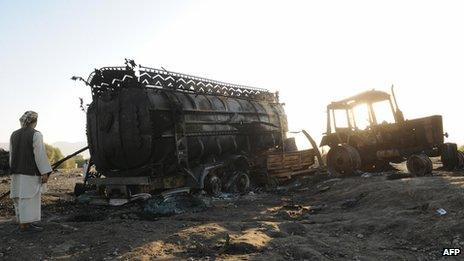German court hears Afghan tanker attack lawsuit
- Published

A German court has begun hearing the cases of 79 Afghan families seeking damages for the deaths of dozens of civilians killed in a 2009 air strike.
The families represent victims who died when a German commander ordered the attack on two fuel tankers stolen by insurgents.
The families are seeking 3.3m euros (£2.8m; $4.3m) from the German government.
In 2010, the German defence ministry paid out $430,000 to victims' families.
At the time, German authorities labelled the payment as humanitarian aid and said it did not constitute an acceptance of legal responsibility.
The attack on the tankers happened near the northern Afghan town of Kunduz.
At least 90 people were killed, though a lawyer for the Afghan families contends that 137 people were killed. Many of the victims were women and children trying to siphon fuel as the tankers had been abandoned.
The incident triggered a major political controversy in Germany, leading to the resignation of the then-Defence Minister Franz Josef Jung and the dismissal of army chief Wolfgang Schneiderhan.
Germany's parliament described it as "one of the most serious incidents involving the German army since the Second World War".
Widowed mother
The hearing at a court in the western city of Bonn on Wednesday focused on two claims. One is a father seeking 40,000 euros after the death of two of his children and the other is a widowed mother-of-six whose claim amounts to 50,000 euros.
The German government attempted to have the case thrown out, arguing that the air strike was under the command of Nato, and Berlin alone could not be blamed.
"The federal republic of Germany is not the right respondent. The conditions (for a lawsuit) have not been fulfilled," said government lawyer Mark Zimmer.
However, presiding judge Heinz Sonnenberger agreed to hear the lawsuit. He said that the case would hinge on whether the plaintiffs could prove state liability for the loss of life.
"We will have to review whether international humanitarian law has been violated," he told the court.
Peter Derleder, a lawyer for the plaintiffs, said he felt confident after the first day of the hearing.
"The court did not rule out a claim based on a violation of international law," he said. "There should have been a warning flight to put civilians on alert."
The court will resume hearing the case on 17 April.
About 4,400 German troops remain in northern Afghanistan, carrying out mainly training and reconstruction roles, though their number is being gradually reduced.
- Published6 August 2010
- Published7 September 2009